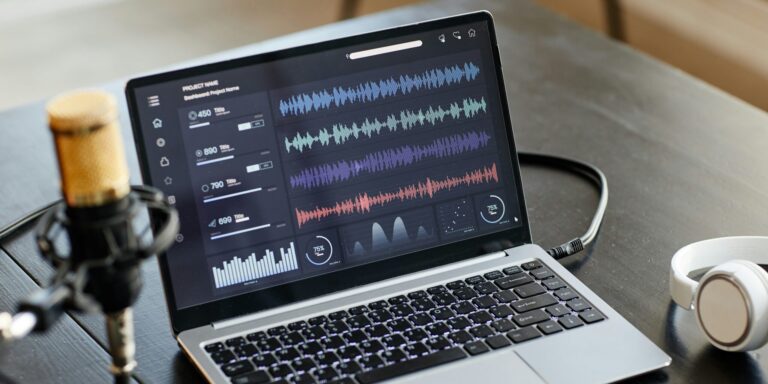Artificial Intelligence (AI) is rapidly making its presence felt across every corner of the music industry—from generating beats to mastering tracks and even writing lyrics. While some musicians welcome AI as a tool that democratizes music creation, others fear it may replace the authentic touch of human artistry. This article explores the pros and cons of AI in music and what its rise means for the future of the industry.
AI’s influence in the music industry is growing exponentially, reshaping how music is made, produced, and consumed. AI tools are now used to generate melodies, optimize sound, and even craft lyrics, with programs like OpenAI’s Jukedeck and Google’s Magenta leading the way. As these technologies advance, there are pressing questions about whether AI can truly capture the essence of music or whether it will only enhance human creativity.
AI’s Impact on Songwriting: Enhancer or Replacement?
AI programs have proven capable of generating original melodies and harmonies, raising the question: can a machine replicate the emotional depth of human songwriting? Music has long been an expression of personal emotions and experiences. AI-generated music, while impressive, may lack the raw human element that often makes a song resonate deeply with listeners.
However, many musicians are not seeing AI as a replacement for their artistry but rather as a tool that enhances their creative process. For instance, some artists use AI to overcome writer’s block, discover new musical ideas, or experiment with novel sounds. These tools serve as collaborators, not competitors. While AI can generate music, it still lacks the personal connection that makes a piece of music stand out.
The Business Side: Cutting Costs and Accelerating Releases
AI also offers significant business benefits, especially for independent artists. Music production can be prohibitively expensive, particularly for newcomers who lack the resources for professional studio time and full production teams. AI-powered programs, however, allow artists to produce high-quality music at a fraction of the cost. For example, platforms like LANDR offer AI-based mastering services, enabling artists to optimize their tracks without needing to hire an engineer.
Additionally, AI tools can speed up the production process. With machine-generated beats and algorithms that suggest song structures or lyrical themes, artists can accelerate their releases. In an industry that thrives on constant content output, AI helps musicians keep pace with demand. This ability to quickly produce polished tracks allows independent artists to compete with major labels, reducing the barriers to entry in the music world.
The Human Element: The Soul of Music
Despite the advantages AI brings, many argue that machines can never replace the soul of music. The emotion behind a song—the unique voice of a singer, the improvisation of a guitarist, or the vulnerability expressed through lyrics—is what connects music to its audience. AI-generated songs, while technically proficient, may still lack the authenticity and personal touch that come with human-created music.
Furthermore, the process of creating music is deeply personal. Musicians pour their emotions, stories, and perspectives into their work, creating something that resonates with listeners on a human level. While AI can analyze patterns and generate musical ideas, it cannot embody the same personal experiences that make music meaningful.
Ethical Concerns: Copyright, Royalties, and Authenticity
As AI-generated music becomes more prevalent, ethical concerns arise, particularly around copyright and royalties. If a song is created entirely by an AI program, who owns the rights? The software developer, the artist who used the tool, or the machine itself? These questions challenge existing copyright laws, which are not equipped to address AI-created content.
Moreover, the rise of AI in music raises issues about the value of original works. If AI can generate an endless stream of songs, it could dilute the uniqueness of human-created music. This could lead to concerns about the devaluation of artistry and the authenticity of music in the digital age. As AI-generated content fills the market, the question becomes whether listeners will still be able to recognize and appreciate the value of music created by human hands.
Real-life Case Studies: AI in Action
Despite the controversies, some artists have embraced AI as an essential tool for their creative process. Electronic musician Holly Herndon, for example, collaborated with AI to produce her album PROTO, blending human voices with machine learning algorithms. She views AI as a creative collaborator, helping her explore new sounds and possibilities.
Pop artist Taryn Southern has also used AI to help create her album I AM AI. Using a machine learning program, Southern was able to generate melodies, beats, and harmonies, pushing her music in directions she wouldn’t have thought to explore on her own. For both Herndon and Southern, AI has been a tool for creative expression, expanding the boundaries of what is possible in music.
However, not all artists are keen on incorporating AI into their work. Many musicians, such as Taylor Swift and Ed Sheeran, emphasize the importance of human touch in songwriting and production. For these artists, AI may be a useful tool, but it can never replace the emotional depth and personal connection that comes from creating music by hand.
Conclusion: A Blessing or Curse?
The rise of AI in music has both its champions and its critics. For some, AI represents an exciting opportunity to democratize music production and make it more accessible. Independent artists can now create professional-quality tracks without the need for expensive resources. For others, AI threatens the authenticity and emotional connection that have always been central to music.
Ultimately, the future of AI in music may lie in finding a balance. Rather than viewing AI as a threat to creativity, musicians may come to see it as a valuable collaborator. By using AI as a tool to enhance human artistry, rather than replace it, the music industry could usher in a new era of innovation and creative expression.


